Multiple Myeloma Fighters and Survivors Share 5 Reminders For Anyone Dealing With a Cancer Relapse
Developed in partnership with Health Stories Project.
Almost all cancer fighters and survivors have dealt with the thought of a relapse at some point along their journey. For many, treatment progression isn’t always a straight line, and that’s okay. Anything, no matter how small, can set off the thought of cancer coming back. For Multiple Myeloma fighters (or MMers) however, this fear can be even greater.
In partnership with our friends at Health Stories Project along with our #IHCFamily, we want to talk about relapse and refractory cancer, specifically Multiple Myeloma - with the hope that it will spark an even bigger conversation. Each of the stories below represents current fighters and long-time survivors, sharing a sense of hope and insights for anyone who has faced or is currently facing a cancer relapse.
If you have a relapse/refractory Multiple Myeloma story you’d like to share learn how you can help others by sharing your experiences with Health Stories Project.
Diagnosed: 2006
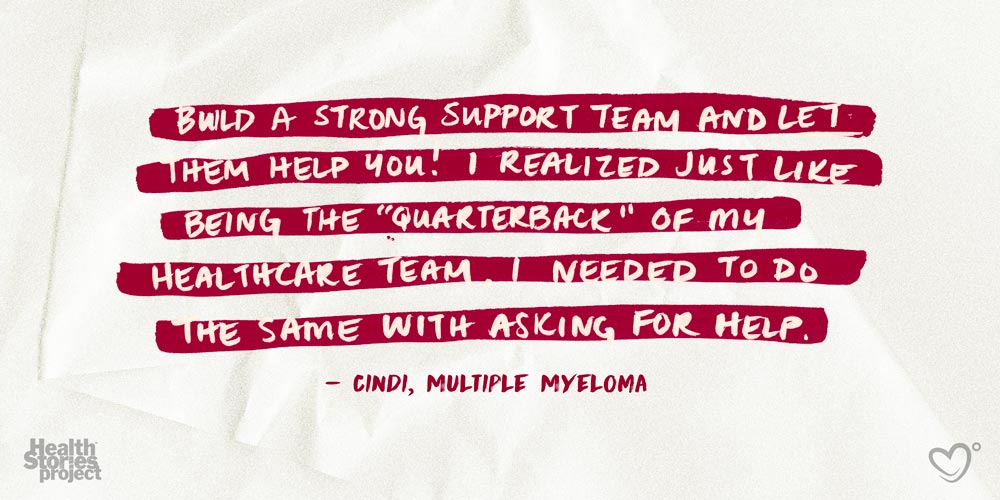
As a 12 year survivor of Multiple Myeloma I have been all up and down the road with remission, very good response, little evidence of disease and most currently relapse. I achieved full remission for 4 years. Then started Revlimid which brought me to VGPR X VGPR: (Very good partial response); Treatment outcome where there is a greater than 90% decrease in M protein; also known as very good partial remission. and controlled disease for 5 years. Since 2016, I have experienced relapse of lesions, breaks, plasmacytoma X plasmacytoma: single tumor comprised of malignant plasma cells that occurs in bone or soft tissue. Patients with a plasmacytoma may develop myeloma. tumors and am on my 4th treatment. I have been on 3 different treatment drug therapies in the last 6 months, currently on Kyprolis X Kyprolis: A drug used to treat Multiple Myeloma. , Revlimid, X Revlimid: A drug used to treat Multiple Myeloma. Dex. X Dexamethasone: A drug used to treat Multiple Myeloma.
Emotionally, the hardest part of my diagnosis was the disbelief at such a young age. I was 42 and to me, I "didn’t fit the profile". When you relapse and treatment works it is a relief and you get back to LIVING sooner. When you relapse and keep trying treatments and experiencing pain, it is overwhelming and scary. You find ways to cope as I did by staying on routine, working full time (it’s a great distraction), trying new things (in 2016 I climbed Machu Picchu) and having a great caregiver (my husband).
Survivorship is a mental game to me. A positive attitude, strong faith, and it will be what it will be! Do what you can while you can do it!
Build and find a strong support team of family, caregiver, friends, church family and LET them help you! Asking and admitting we need help is often the hardest first step. Many people WANT to help. Sometimes I had a hard time keeping up with basic things like groceries or doing chores around the house. I realized just like being the “quarterback” of my healthcare team, I needed to do the same with asking for help. I had specific things for people to do, for example, a grocery list, changing linens on my bed, getting the oil changed in my car, just to name a few.
You’re not alone on the walk. Knowing others that are walking the journey is inspiring to all patients. Which is why I choose to LIVE my life with cancer, not have CANCER and live my life! And share that with others.
Help others by sharing your experience with relapse or refractory Multiple Myeloma. Health Stories Project has an opportunity for you to make a difference.
Diagnosed: 2015
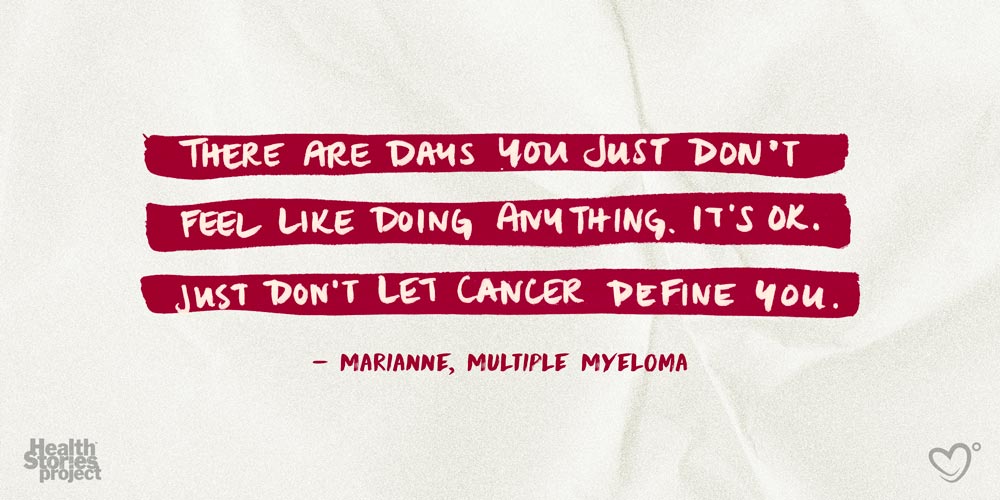
I was diagnosed on February 25, 2015. I had a tumor in my cervical spine that had engulfed level 2 of the cervical spine. It was very painful but I had no clue that I had cancer, Multiple Myeloma. I was devastated with the diagnosis and thought it was a death sentence.
I started immediately with radiation treatments then chemo and surgery. About a month in I restarted chemo. I chose not to do any aggressive chemo because it was about quality of life, not quantity. It took my oncologist a minute to understand my decision but he has supported me 100% since then.
I chose not to do the stem cell transplant because it was only 50/50 and I wanted better odds to put myself through something so aggressive. I did have Kyprolis but for a very short time.
Once I made it to my one year it was a reality check and I realized that I could do this. I immediately began to change my whole thinking about life. Up until that one year mark I fully expected that I was celebrating my last Christmas and according to the internet my life at best was only 1-5 years.
Recently my doctor said I was doing the best I’ve been in two years. Don’t give up. It isn’t a death sentence and yes there are days that you just don’t feel like doing anything but I make myself get up and get going. It is ok to have a pity party but just don’t let that define you. Cancer is a bump in my road of life but it doesn’t define me.
I go to a support group and I attend counseling to help me handle everything that has come my way but I am my biggest advocate. You cannot just let your doctor or family take control of your treatment. You must stand up for yourself and only you can control your life. I have a hard time taking compliments from people telling me I’m so strong. I don’t see it that way but more like I’m just trying to live my life before the cancer shock. I won’t let my oncologist tell me what stage I’m in because I don’t want to know. Right now I’m living my life the way I want to live it.
Health Stories Project connects people with opportunities to make a difference. Learn more about sharing your cancer experiences.
Diagnosed: 2014
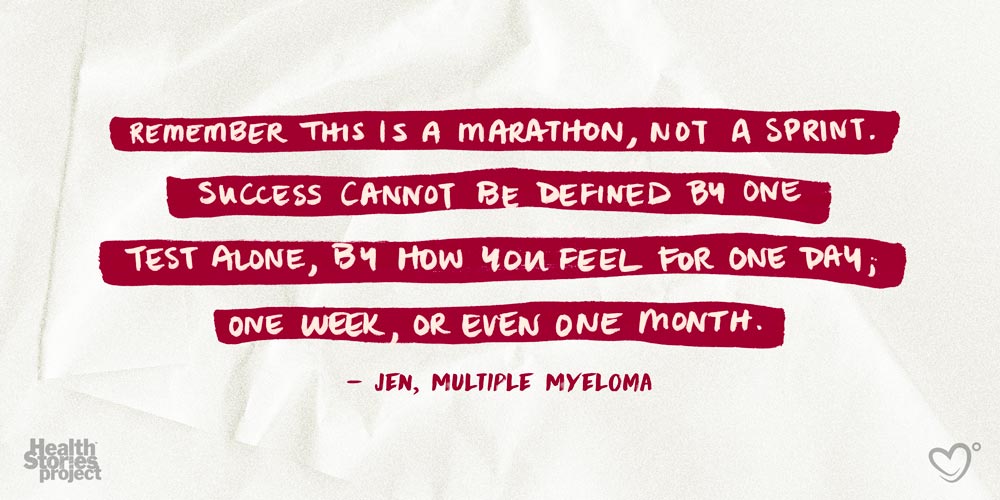
Nearly four years ago, in October 2014, I was just a full-time working wife and mom to three young children under the age of seven. My crazy life came to a screeching halt when I went into the Emergency Room with an eye infection. Within 48 hours, I was unconscious, on a breathing tube, a feeding tube, received dialysis twice and had the bone marrow biopsy that would ultimately confirm a diagnosis of Multiple Myeloma. Even though Myeloma is the second most-commonly diagnosed blood cancer, behind non-Hodgkin’s lymphoma, we had never heard of it.
I underwent three months of this induction X induction therapy: initial therapy for myeloma. This term also refers to the use of anti-myeloma drugs prior to high-dose chemotherapy and stem cell transplant in order to reduce the tumor burden. chemo treatment, all in preparation for a stem cell transplant. X stem-cell-transplant: therapeutic procedure in which bone marrow or peripheral blood stem cells are collected, stored, and infused into a patient following high-dose chemotherapy to restore blood cell production.
After some ups and downs with my numbers, in April 2016 I finally achieved a Stringent Complete Response X Stringent-Complete-Response: a treatment outcome where there are no detectable plasma cells in the bone marrow or myeloma proteins in the serum or urine using very sensitive techniques. – the A+ of responses to Myeloma – which I am grateful to say I am still in today.
The cancer diagnosis I never expected at the age of 42 taught me many invaluable lessons.
Focus on how far you’ve come, and not how far you have to go. When I was diagnosed, I was sick…really, really sick. For my family, it wasn’t initially about when I was going to come home, but IF. I’ve come a long way since my initial diagnosis, being healthier now than I’ve been since then. It can be easy to get frustrated when my awful immune system causes me to get sick or sidelines me from one of my kid’s activities but the truth is, I am lucky to be here to see most of them.
To that end, remember this is a marathon, not a sprint. Multiple Myeloma is currently incurable but can be highly treatable for many (lucky) people. For those patients, Myeloma can be treated similar to other chronic diseases which means there will be ups and downs and success cannot be defined by one test alone, by how you feel for one day, one week or even one month. You must watch for trends, not a single point-in-time, individual result.
Despite all of the many advances in the management of myeloma, the only way to keep pushing to find a cure for myeloma is to continue to shine a spotlight on this disease. That is why I am vocal about Multiple Myeloma. Maybe sharing my story and experiences can help others.
Health Stories Project has an opportunity for you share your multiple myeloma story with others. Find out more.
Diagnosed: 2010
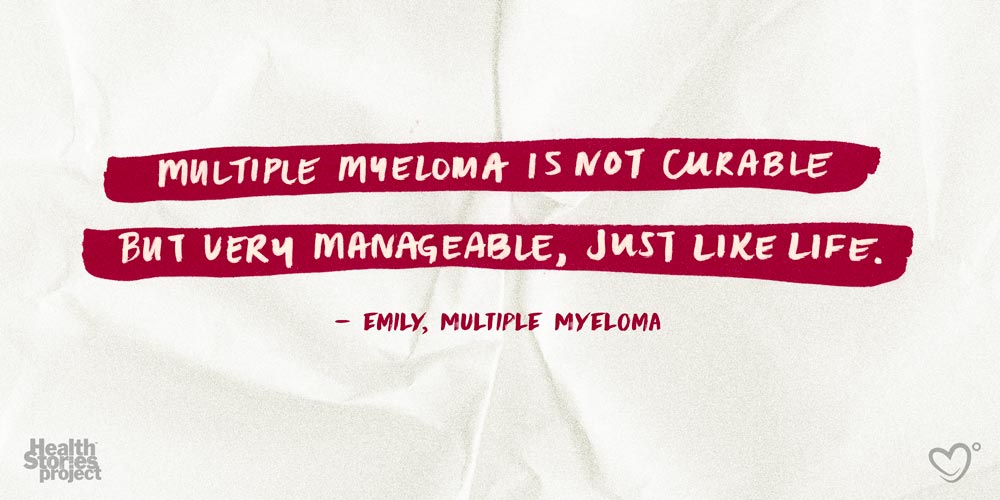
I recommend finding others with myeloma to lean into for the process, knowing someone who is 12 and almost 20 years into their refractory myeloma X refractory-myeloma: refers to when the cancer does not respond to therapy. In some patients, the cancer may respond to initial treatment, but not to treatment following a relapse. has been very inspiring and helpful.
Diagnosed: 1997
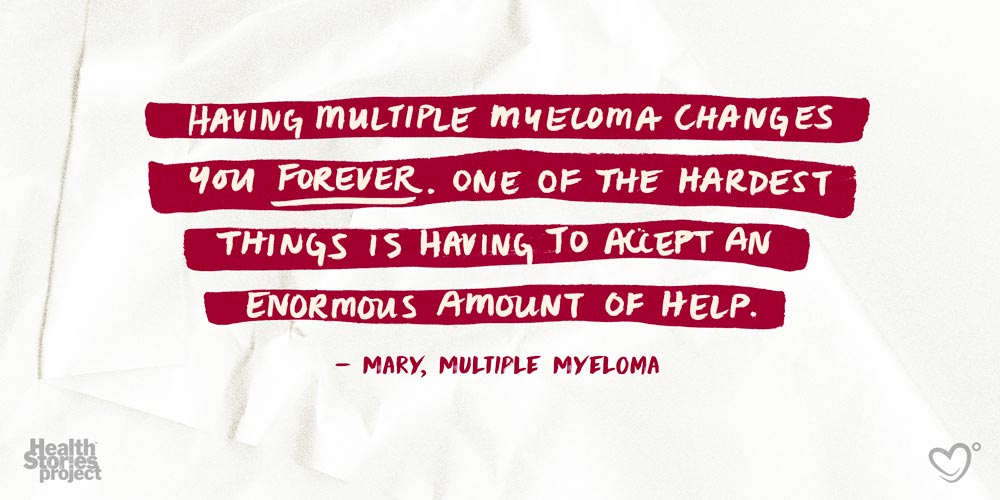
One of the hardest things for me personally was having to accept an enormous amount of help from my husband, caring friends and even some casual acquaintances who stepped in to help keep our daily lives going forward. Emotionally, you are never the same either. I have never had a recurrence of MM, but I do have lingering reminders. I still hold my breath every three months when I have blood work drawn and always count my blessings.
Do you or someone you know have experience with cancer relapse? Health Stories Project has an opportunity for you to share and help others.
Thank you for sharing, Cindi, Marianne, Jen, Emily and Mary. Taking the time to share your experience is so important for the next person who is dealing with the same issues.
Disclaimer: Please note that this article is not intended to treat, diagnose, or be a substitute for medical advice. Seek the advice of your physician or other qualified health provider regarding your experience with relapse.








Team I Had Cancer is the group of people behind the scenes, making sure IHadCancer.com is running, and that you're connecting to the people you need to know for the support and information you need while dealing with cancer.